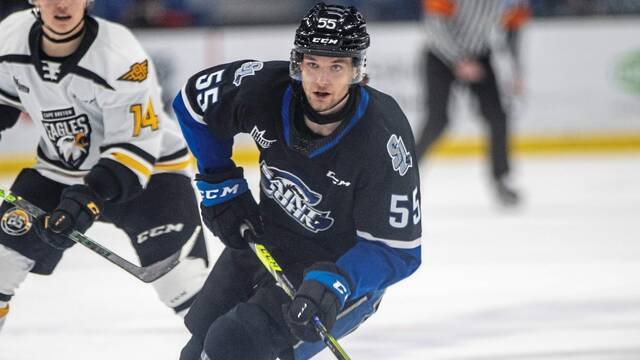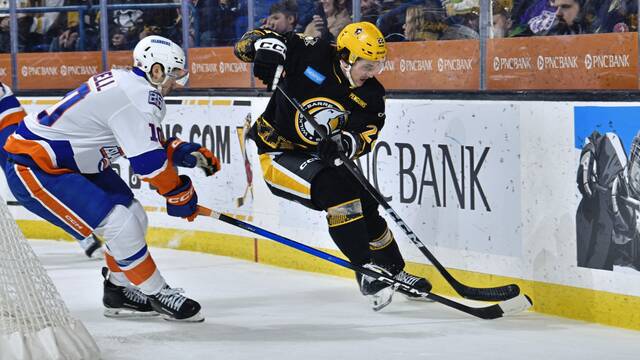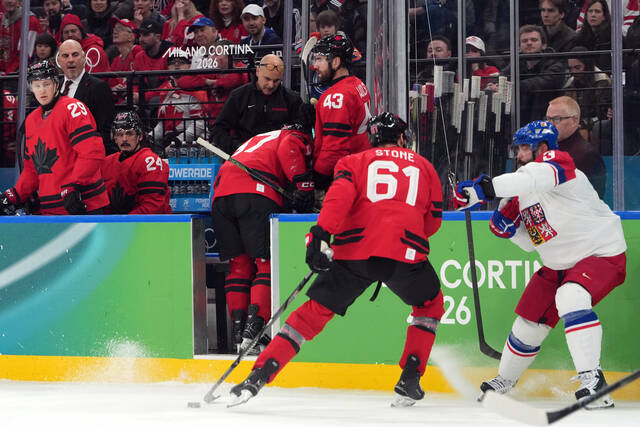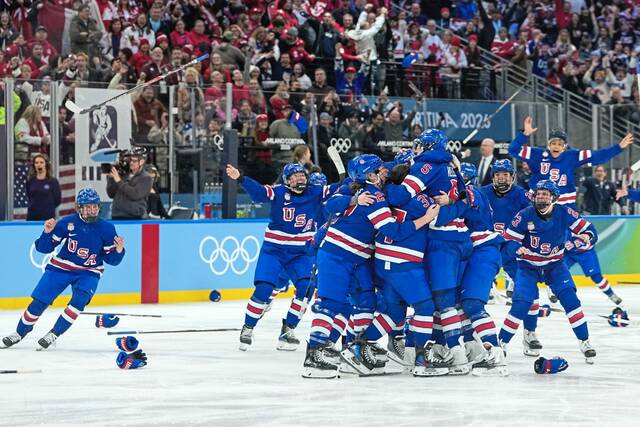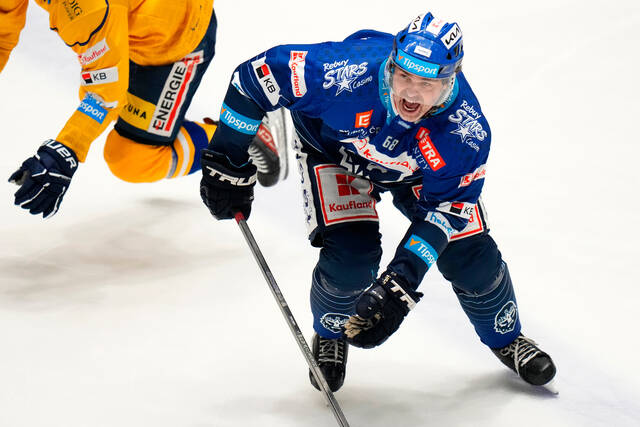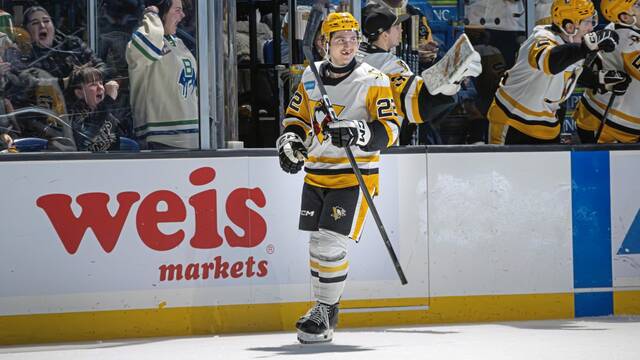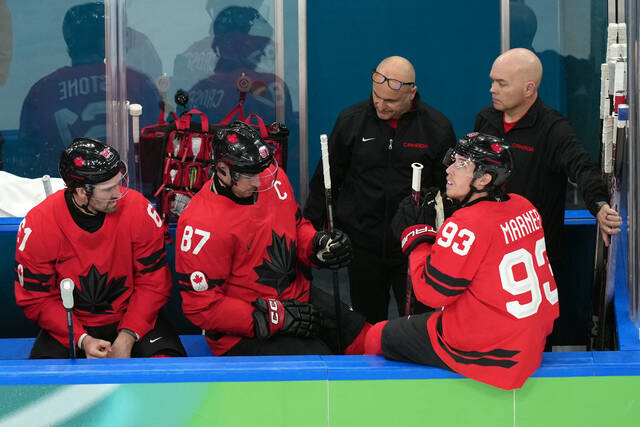Tom Kostopoulos knows a thing or two about grit.
After all, he carved out a 20-year playing career as a hard-scrabble checking forward, including 12 seasons in the NHL.
That’s a lot of forechecking, plenty of bruises from blocking pucks or absorbing hits on the boards and more than a few fights.
So when the subject of gritty players is broached, the Pittsburgh Penguins’ director of player development speaks from an area of expertise.
In the case of Penguins forward prospect Raivis Ansons, Kostopoulos doesn’t suffer from a poverty of words.
“I might need more time to talk about him,” Kostopoulos quipped after the Penguins’ development camp in Cranberry last week. “He’s a special kid. I don’t think Raivis knows how good of a hockey player he is.
“He does things on the ice that don’t always get noticed but are essential to winning. He makes little plays with the puck. He makes wall plays. He’s defensive. You don’t see many kids at his age block pucks the way that he does. He just does all these little things well, he kills penalties, he plays on the power play. I’m really excited about Raivis.”
A native of Latvia, the 20-year-old Ansons was the Penguins’ fifth-round pick (No. 149 overall) in the 2020 NHL Draft and just signed a three-year entry-level contract with the team May 2.
But before his professional career could begin, he had some work to complete at the junior level.
In June, he had a prominent role in the Saint John Sea Dogs of the Quebec Major Junior Hockey League claiming the Memorial Cup as the top junior team in Canada.
Saint John was eliminated early from the QMJHL postseason, but as hosts of the Memorial Cup, they participated in the tournament against champions of the QMJHL, Ontario Hockey League and Western Hockey League.
Primarily working on the left wing of Saint John’s second line, Ansons collected five points (one goal, four assists) in the tournament.
“It was very fun,” said Ansons, who was traded to Saint John in January. “We had a whole month to get ready for it. We practiced every day, had a couple of scrimmages and just went out. We were ready to play, ready to go. It felt good when we won. An awesome feeling.”
Ansons’ contributions went beyond his offensive figures.
“He was a difference maker for our team,” Saint John interim coach Gardiner MacDougall said. “In the first game, I think he was the first star. We had 39-day layoff between the playoff round and the first game of the Memorial Cup. We’re playing the Ontario Hockey League champion, and he had three points that game.
“His best asset is his two-way ability. He played on the power play as a net-front guy. He was our first guy out on the penalty kill. We had him as a winger but he also played center. So he’s kind of multi-dimensional as far as where he can play. He’s really good away from the puck. He makes good plays with the puck. He’s one of those guys who will chip the puck out, chip the puck out. He’s very fundamentally strong.”
Perhaps the greatest indicator of Ansons’ impact on the ice was when he was deployed.
That’s to say, when the Sea Dogs had late leads, he was trusted to maintain those leads.
“When we would get a lead, he would take over as center,” MacDougall said. “We had a lot of one-goal games, and he’d play prominent minutes for us. He’d be our top two-way player for us.
“He can be an asset on the forecheck. He’s got a good stick where he creates loose pucks and separation, that type of thing. But he plays really well as the high forward or the ‘F3’ forward and is really good in his own end. He plays really good down low. He’s good on the wall, wins a lot of battles, chips pucks. Down low, he had good coverage there. Put it this way, we couldn’t use him enough when we had a lead, especially in the third period.”
While he grew up in Latvia, Ansons plays a style that fits in well with most North American teams. He primarily played on smaller rinks in Latvia, closer to dimensions found on this continent as opposed to the larger rinks most European countries employ.
“It’s pretty similar, I think,” Ansons said. “There wasn’t really a lot of Olympic (sized) rinks from where I played. Maybe one. Here’s it’s much more faster, more physical. More offensive.”
Ansons has a strong command of English. But he played most of his junior career in Quebec, where French is the prominent language. In particular, he spent most of the first three seasons of his junior career with the Baie-Comeau Drakkar, a team based in Northern Quebec, a part of the province that speaks relatively little English, aside from members of the team.
“I think it was fully French in Baie-Comeau,” Ansons said. “Wasn’t expecting that. Had good teammates that spoke (English and French). So it wasn’t really a big language barrier for me. And the coach (spoke) English, too. And my billets spoke a little bit of English, too.”
Like just about any hockey player, the 2020-21 season presented considerable challenges because of the pandemic. In Ansons’ case, he was stuck in Latvia for most of the fall in 2020 because of the Canadian border largely being closed to international travelers. That forced him to play some games in the Latvian Higher Hockey League before Penguins management was able to finagle a way for him to get into Quebec through the United States.
“Played (12) games in the Latvian league,” he said. “Got an invite to (the Wilkes-Barre/Scranton Penguins’) training camp. It was easier to get to the border. It was an easier way to get there. It was also at the end of the season, too. So I only played nine games in the (QMJHL), too.”
In total, Ansons only played 23 games between the LHHL and the QMJHL (including playoffs) during the 2020-21 campaign.
His maturity during that adversity impressed management.
“It’s been tough with the travel and the pandemic,” Kostopoulos said. “Being up in Baie-Comeau and being traded and everything he’s been through. But he’s got a good head on his shoulders and a good family.”
He also has a good model to follow in Penguins forward Teddy Blueger, a fellow Latvian who has reached out to Ansons a handful of times, according to Kostopoulos.
Including Blueger, only five Latvians played in the NHL last season.
Ansons, who is expected to open next season with Wilkes-Barre/Scranton, would obviously enjoy joining that small fraternity.
“That would mean a lot,” Ansons said. “There’s not a lot of Latvian players. Just kind of take pride if you’re here. You have to work hard to get here. … They’re all hard workers. They’re just doing their thing, making it happen. They make you proud to be a Latvian.”



